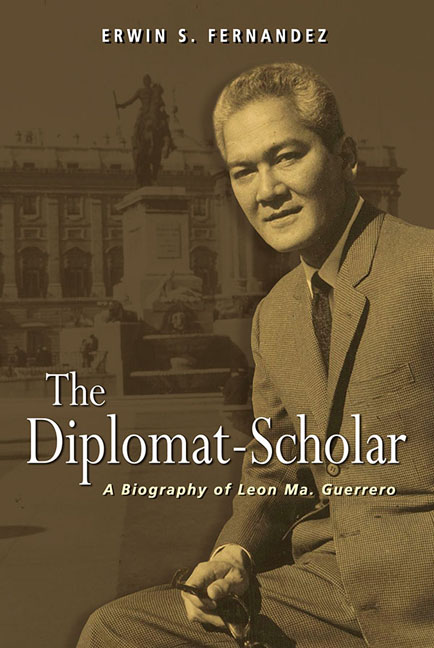Book contents
- Frontmatter
- Dedication
- Contents
- Preface
- Prologue
- Chronology
- I Ermita and Santa Cruz to Intramuros: Between Literary and Legal Career
- II To Tokyo and Back: The Making of a Diplomat
- III Going In, then Out of the Political Jungle: Padre Burgos to Arlegui
- 9 The Legal Counsel, Professor and Translator
- 10 The Foreign Policy Critic and Spokesman
- 11 “Asia for the Asians” or How to Leave Arlegui in Six Months
- IV London and Madrid: The Philippines in a Resurgent Asia
- V New Delhi to Belgrade: The Philippines towards Non-Alignment
- Epilogue
- Glossary
- List of Abbreviations
- Bibliography
- Index
- About the Author
10 - The Foreign Policy Critic and Spokesman
from III - Going In, then Out of the Political Jungle: Padre Burgos to Arlegui
Published online by Cambridge University Press: 12 January 2018
- Frontmatter
- Dedication
- Contents
- Preface
- Prologue
- Chronology
- I Ermita and Santa Cruz to Intramuros: Between Literary and Legal Career
- II To Tokyo and Back: The Making of a Diplomat
- III Going In, then Out of the Political Jungle: Padre Burgos to Arlegui
- 9 The Legal Counsel, Professor and Translator
- 10 The Foreign Policy Critic and Spokesman
- 11 “Asia for the Asians” or How to Leave Arlegui in Six Months
- IV London and Madrid: The Philippines in a Resurgent Asia
- V New Delhi to Belgrade: The Philippines towards Non-Alignment
- Epilogue
- Glossary
- List of Abbreviations
- Bibliography
- Index
- About the Author
Summary
Outside his work in the Senate, Guerrero closely monitored world events, a habit which eventualy earned him a reputation as a wellknown political analyst who aired his views on current international affairs, particularly the emergence of the Cold War. Since the Philippines was closely allied with the United States, the Cold War demanded special attention from Filipino policymakers and analysts. Before the Malolos Rotary Club in late July 1950, he disclosed how Russia would engage in “little wars” to further its world domination in places like Indochina, Greece and Iraq by using its allies, thus weakening the United States. Russia, he said, was not ready to start a war against the United States but in due time, Russia could challenge the United States with the aid of new weapons of war. In the case of an atomic war, however, the United States, he believed, had the advantage over Russia since the former stockpiled atomic bombs. Guerrero stressed the importance of the United Nations in the maintenance of world peace.
At the Manila Overseas Press Club, he graced the inaugural meeting of the Manila Round Table, a group interested in international and national issues, discussing American policy in the advent of communism in Asia. At the Y's Men's Club, on its special United Nations Week programme, he spoke about a new United Nations that had emerged from the old one established in San Francisco since the outbreak of the Cold War, before flying to Dublin, Ireland to fulfil his function as member and secretary of the Philippine delegation to the International Parliamentary Conference. Special to the Philippines Herald, he wrote his sharp impressions of Europe in a series of articles at a time when Europe was slowly taking steps towards a European Community.
The following year, in a regular weekly luncheon meeting of the Manila Rotary at the Manila Hotel, speaking before diplomatic and consular representatives of Southeast Asian countries, he characterized Asian nationalism as anti-Western and anti-capitalist in the wake of India's rejection of the San Francisco peace treaty and Iran's agitation for the nationalization of its oil industry.
- Type
- Chapter
- Information
- The Diplomat-ScholarA Biography of Leon Ma. Guerrero, pp. 119 - 127Publisher: ISEAS–Yusof Ishak InstitutePrint publication year: 2017

